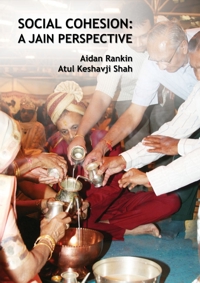The Jain expression Parasparopagraho Jivanam is most literally rendered in English as ”all life is interconnected”. Mahavira taught that “Non-violence to all living beings is kindness to oneself” and conversely “You are that which you intend to hit, injure, insult, torment, persecute, torture, enslave or kill”. These teachings are generally cited, quite rightly, as proof of the Jains’ respect for nature and ecological consciousness. All forms of life, even (to human eyes) the most primitive or basic, have intrinsic value. They depend on each other, both for their own survival and the ecological balance on which all of life depends. Each life form is unique and irreplaceable, but at the same time there is continuity between them. In Jainism, as in the science of ecology, there is a web of life.
These “green” principles at the heart of Jain thinking translate into relationships between human beings. Or, to put it better, they affect human relationships because humanity is part of the web of life, rather than above or outside it, as we sometimes arrogantly assume. Our attitudes and behaviour towards ”the rest” of nature should govern our attitudes and behaviour towards fellow humans. Thus the Jain idea of social cohesion is really a form of human ecology.
In this context, Mahavira’s words remind us of two important social concepts. One is the uniqueness and value of every human being. The other is the need for humans to co-operate with each other to survive and fulfil their potential. Today, these ideas are too often presented as if they are in opposition to each other. Former Prime Minister Margaret Thatcher for instance, famously asserted that “there is no such thing as society” but “only individuals and their families”. At the other extreme, “society” can be equated with a bureaucratic and overbearing state which diminishes the individual’s dignity.
Both these positions are wrong because they are one-sided. Extreme individualism in practice degrades the individual, reducing him or her to a mere economic unit or consumer. It promotes a mentality of selfishness, which is the opposite of genuine self-interest, and callousness towards fellow citizens - and, by extension, the environment and the planet. The ideology of individualism underpins the breakdown of families and communities, the rise of gross inequality and distrust between different sections of the community. At its worst, it creates a climate in which violence appears as a legitimate “option” and neglect or ill-treatment of children and the old becomes acceptable. This version of individual does not make us freer, but merely less secure, because it ignores the human impulse towards co-operation, which is both socially and spiritually inspired.
Equally, the bureaucratic view of society creates an attitude of passivity and dependence, without properly addressing the inequalities by which society is disfigured. If anything, the bureaucratic collectivist approach increases inequality, because it robs people of the capacity to control their own lives and take responsibility for those around them. Although well-meaning, this form of collectivism adopts a one-size-fits-all mentality rather than the more difficult task of accepting and working with human diversity. Usually, that mentality includes an inflexible, “target-driven” view of social or environmental problems, remote from real people and real communities. This is the mirror image of narrow individualism, undermining the sense of community and belonging on which social cohesion is based and the relationships of trust which enable it to work in practice.
It follows that these two approaches to society, individualist and collectivist, are not really opposed to each other but have much in common. Both take an imbalanced view of the relationship between the individual and the community. Both are based on mechanistic and materialistic conceptions of “progress”. The only things that “matter” are those which can be measured and quantified, ignoring the ties of friendship, affection and commitment that give life its meaning.
Social policy has veered uneasily between the two poles of narrowly defined individualism and bureaucratically enforced collectivism. For essentially the same reasons, both have failed. What is needed instead is a recognition that the individual and society matter equally and are continuous with each other rather than separate. The success of one is impossible without the stability of the other. Equally, there is more to individual fulfilment and social success than the purely material, including continuous economic growth as an end itself. For the emphasis on material progress, divorced from other areas of life, has proved to be socially harmful and divisive.
Material security, indeed prosperity, is important for our society’s survival, but only when balanced with what can be broadly interpreted as spiritual. This word is often associated with organised faith, but it encompasses far more and is by no means confined to those who have religious beliefs. The spiritual dimension includes a wide range of human activities that cannot be described in solely materialistic terms. Examples include: humanitarian activities and charitable giving, ethical enterprise, public service (paid and unpaid), neighbourliness and sense of community, the protection of the environment, wildlife and animal welfare, family life and networks of friendship. These connect all areas of human life together. They are parts of the human ecosystem on which social cohesion is based. Jainism is far from unique in its emphasis on the balance between individual and society, between the material and spiritual dimensions of life. Such ideas are, for example, staples of Jewish, Christian and Islamic thought and equally important to most forms of secular humanism. Yet the Jain dharma is founded on the idea of balance, with balance between humanity and the planet as its starting point. Jainism is a philosophy of both/and in place of either/or. It regards diversity, including diversity of opinions, as a strength and recognises that many of the “choices” we are currently asked to make - between individual and society, for example, or between human and environmental well-being - are illusory or false. Jainism promotes personal restraint, in the interests of compassion for all life (including one’s own) and an understanding that all life is intimately connected. The Jain idea of karma reminds us powerfully of our inheritance and our obligations to those not yet born.
There are, therefore, good reasons why Jain perspectives relate so well to and can enhance the present public debate about social cohesion. Jains do not evangelise, seek “converts” or attempt to impose their ideas, and so others can freely draw from Jain ideas and find their own faith or philosophy of life enriched by the process.
From a Jain standpoint, the causes of social breakdown are complex and intricate, and so must be addressed with delicacy and care. But at another level, they are straightforward and easily explicable. If we think of society as an ecosystem, we can also think of social problems as forms of ecological imbalance. And just as ecological imbalance - most of it human induced - threatens species and habitats, poisons the atmosphere or changes the climate, social imbalance disrupts the rhythms of human life. Violence, in its various forms, is a product of such disruption. It is a sign that the human ecosystem is out of balance, as a result of warped priorities and the breakdown of relationships of trust. Increasing violence has a profound influence on us all, even if it appears ‘only’ to affect certain areas, communities and age groups. The fear it generates is debilitating and makes society far less cohesive. But from the Jain perspective, it challenges us all, as individuals, to question our values and actions. It challenges the complacent assumptions many of us have about our own virtue and realise that too often we pay lip service to compassion, social justice and inclusion, but remain indifferent in practice.
This does not imply that violence is a product of the social environment alone and so violent criminals can be absolved. On the contrary, it is central to Jain teachings that the individual is responsible for his or her actions, and that violence is never permissible. However we are also responsible for each other and so violent behaviour is not something “other” or separate from us, but is connected to many of the decisions we make and most of the problems we gloss over.
Violent behaviour - such as the knife and gun crime that blight some urban communities - is now widely perceived as part of a deeper social malaise. It is a symptom, perhaps the most visible symptom, of a much larger problem requiring many-sided solutions. The Jain definition of violence goes well beyond such acts. A violent society is one in which relationships of dominance take precedence over relationships of co-operation. Exploitation and poverty in the midst of plenty are forms of violence. The competitive spirit becomes violent when it ceases to be a vehicle for initiative and responsibility, and is instead an excuse for callousness. A society that neglects its children or allows its old people to die alone is also a violent society. Unsustainable consumption is a form of violence - against the rest of nature and against the other human beings, both globally and locally.
Violence, according to Jain ethics, means more than aggressive or merely callous behaviour. It includes indifference to others and neglect of one’s own mind and spirit. Violence is the void where compassion should exist. Its subtler politer guises are in many ways more dangerous than its overt forms.
We understand increasingly that different types of violent crime are linked. For example, many who are convicted of violent crimes as adults have histories that begin with bullying or cruelty to animals. Many were victims of abuse themselves or grew up in homes where domestic violence occurred. Similarly, we know that large numbers of people emerge from material poverty to become model citizens. Others who appear privileged become violent or exploitative. Of the former, many have come from loving and cohesive homes or supportive communities. Of the latter, many will have experienced emotional abuse or neglect, or other forms of psychological violence from which wealth offers no protection.
The sense that violence begets violence is an aspect of karma, the law of cause and effect. There is a continuum between petty crime and major offences. There is the same continuum between social injustice and more overt violence, ethical callousness and acts of cruelty. Yet because we are at once rational and sensitive beings, we have the capacity to break these patterns of violence, to be creative rather than destructive, inclusive rather than self-centred.
In our society at present, we have allowed the over-valuing of the material and the superficial, the cult of celebrity and being ‘famous for being famous’. These trends encourage indifference to the needs of others and a corresponding failure to understand one’s own needs. Over-valuing of independence and personal autonomy leads us to neglect interdependence - the essence of social cohesion. The result is not independence and autonomy at all, but an epidemic of loneliness, an increasingly atomised society in which the support networks offered by families and neighbourhoods have become fragmented. Phenomena such as binge drinking and drug abuse - forms of violence against the self - reflect a pervasive spiritual hunger, a sense of emptiness because instant gratification is not enough.
The Jain tradition is keenly aware that our treatment of the environment is reflected in our treatment of fellow human beings (and vice versa). From this it follows that the division between “environmental” and “social” issues is artificial. Ultimately, they are one and the same. There is an intimate link between the aspects of social breakdown that threaten us, collectively and individually, and our careless attitude towards the natural world, in which we place short-term “growth” before long-term stability and survival.
A sustainable social policy is impossible without a parallel commitment to ecological sustainability. Both require essentially the same change of consciousness and shift of priorities. In this, Jain philosophy can provide a useful point of reference. For it has always recognised that we achieve the most when we learn to live within limits, and gain the most control over our own lives when we exercise restraint.
Much of the debate about social cohesion is negative in nature. This is necessarily so, because the growing sense of dislocation is a matter of concern to policy makers - still more so to citizens coming to terms with the changes taking place around them. At the same time, there are many positive aspects of social change, which we should celebrate and build upon. Increasing equality and balance between women and men has the potential to open up new perspectives, changing the way we live, work and think. Racism remains a serious obstacle to cohesion, yet at the same time racial tolerance has become the norm as the prejudice of previous generations is dismantled.
We live in a society in which many cultures play a part, both distinctively and working together. Political discussion has focused on negative factors, such as racial tension, pressure on housing and schools and illegal immigration. These are serious issues, for social cohesion especially, but the cross-fertilisation of cultures has enriched many areas of our life, from food to music, the art gallery to the sports field. This is surely social cohesion in practice. Likewise, the encounter between faiths is leading to an exchange of ideas from which all faith communities are gaining new insight. This is matched by the growing dialogue between religion and science. Attitudes towards disability are undergoing a quiet revolution, unlocking the potential of millions of men, women and children, acknowledging their equal value and distinctive contribution.
Growing environmental consciousness is also challenging the conventionally held assumptions about progress and growth, replacing them with a more holistic view of humanity within nature and co-operation between human beings. We realise that animals have feelings and experiences as complex as our own and that there is no radical separation between “them” and “us”. This insight alone is revolutionary, for it takes the idea of inclusion beyond the human ghetto and impacts on diet, farming, scientific research and many of the staples of life.
In all these areas, much remains to be achieved, but such developments are a source of creativity and inspiration, as well as values around which society can cohere. They are also in keeping with the principles of equality, tolerance, diversity and careful action that Jains have thought about and practiced for millennia. Government can play a vital role in working for social cohesion, but it is more than a series of centrally-imposed programmes. It is the way we relate to our fellow men and women - at work, at school, in our communities, and in our friendships and family lives. Restoring balance is a process of reconnecting broken strands of the web that holds society’s disparate parts together. This offers a chance for the Jain community and its friends to play a lasting and transformative role.
 Aidan Rankin
Aidan Rankin
 Dr. Atul Keshavji Shah
Dr. Atul Keshavji Shah
